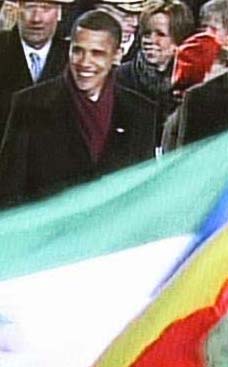
Because of Obama’s popularity and the departure of president Bush, there is a window of opportunity to improve relations between the US and the rest of the world, particularly the Muslim world. He even plans to deliver a major address in an Islamic capital as part of his global outreach, which would target the Muslim world. This is where the perspective on Indonesia enters the picture. Although Indonesia is not a Muslim country, an effective and productive US approach to the Muslim world calls for a much wider and deeper interaction with Indonesia, a Muslim majority. The Obama administration might have learned from the fact that Indonesia and the US have, in the past ten years or so, been unable to avoid irritants in their bilateral ties. Maybe they do not understand each other well enough. Perhaps this can also be a major test for Obama’s public diplomacy, to win the hearts of the Muslim world. Now that Obama is highly praised by the public here and with the presidential and parliamentary elections coming up in Indonesia, there is certainly a window of opportunity for Obama’s administration to improve US relations with Indonesia at a time when the latter seems to be constantly moving toward a “full-fledged democratic” country.
Obama is out to “marry” military power with diplomacy and development initiatives to maximize operative pressure and build the conditions for positive outcomes
Opportunity not to be missed by Obama
Anak Agung Banyu Perwita and Bantarto Bandoro
Bandung, Jakarta
Fri, 01/30/2009 2:02 PM
The newly inaugurated administration in Washington provides an opportunity for the US to “reorganize, rearrange and reorient” its place and role in global politics at a time when its international image has been badly tarnished by the way the Bush administration handled international affairs.
Obama needs not only to start the hard work to restore the US standing and enable the country to meet the new challenges of the 21st century, but also to seize the opportunities that await the country. Such an opportunity was clearly reflected in the great enthusiasm of the members of the international community for Obama’s new perspective on the world’s pressing problems.
We do not mean to underestimate the difficulties Obama and his team might encounter whey they execute their policies. The situation in the Middle East, for example, is volatile, complex and dangerous.
But the administration has made it clear that danger and difficulty will not cause the US to turn away. They also recognize and have said that peace and stability in the Middle East are in the national interest of the US as well as other countries in the region.
Indeed, it is a vital US national interest to create a more durable peace and stability in the Middle East and other corners of the world.
Observing that there are challenging times ahead for the US, meeting these challenges will need tools and solutions. It is against such a background that Obama introduced
his vision of “smart power” that is, using strong diplomacy, in conjunction with aggressive development efforts and a wise application of military capabilities.
The “four Ds” – diplomacy, development, defense and democracy – as one might called them will serve as the four legs of American foreign policy.
Thus, the next four years will see the US in a great adventure, particularly in dealing with pressing issues including the Iranian and North Korean nuclear programs, the Israeli-Palestinian conflict, as well as wars in Iraq and Afghanistan.
Obama is out to “marry” military power with diplomacy and development initiatives to maximize operative pressure and build the conditions for positive outcomes.
However, many other issues in other areas of the world such as in Asia, Latin America and Africa can also not be abandoned Familiarity with Obama, developed during his campaign, seems to be breeding hope. But then again, he is starting from a low baseline, following eight years of an unpopular and uncooperative US president. Maintaining this enthusiasm will definitely be both a challenge and an opportunity given the complexities he and his team now face.
Because of Obama’s popularity and the departure of president Bush, there is a window of opportunity to improve relations between the US and the rest of the world, particularly the Muslim world.
He even plans to deliver a major address in an Islamic capital as part of his global outreach, which would target the Muslim world. This is where the perspective on Indonesia enters the picture.
Although Indonesia is not a Muslim country, an effective and productive US approach to the Muslim world calls for a much wider and deeper interaction with Indonesia, a Muslim majority.
The Obama administration might have learned from the fact that Indonesia and the US have, in the past ten years or so, been unable to avoid irritants in their bilateral ties.
Maybe they do not understand each other well enough. Perhaps this can also be a major test for Obama’s public diplomacy, to win the hearts of the Muslim world.
Now that Obama is highly praised by the public here and with the presidential and parliamentary elections coming up in Indonesia, there is certainly a window of opportunity for Obama’s administration to improve US relations with Indonesia at a time when the latter seems to be constantly moving toward a “full-fledged democratic” country.
A new policy approach which focuses on democracy will further help Indonesia. This in a sense is a long-awaited opportunity not to be missed by the newly installed US president.
Anak Agung Banyu Perwita
is a professor of international relations at Parahyangan Catholic University, Bandung.
Bantarto Bandoro is a senior lecturer in the International Relations Postgraduate Studies Program at the University of Indonesia in Jakarta.













